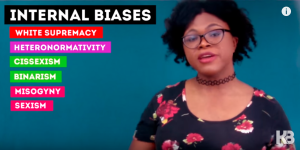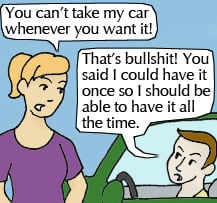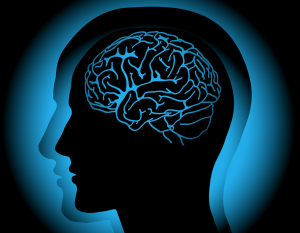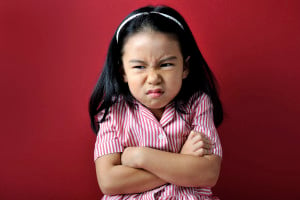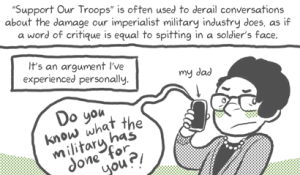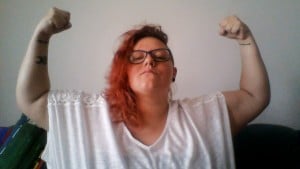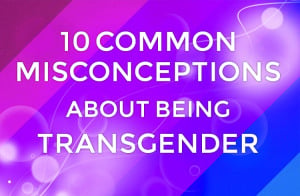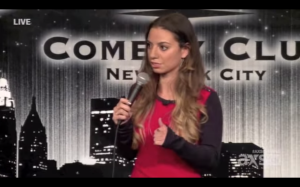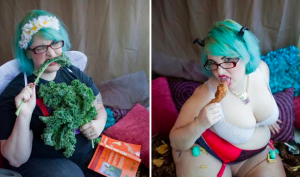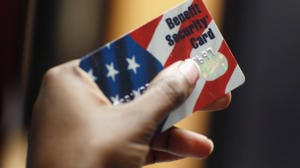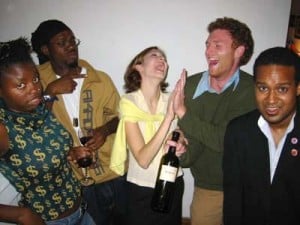Originally published on MikkiKendall.com and republished here with the author’s permission.

A person sits at a desk writing, resting their head in their hand, in front of an open laptop.
As some of you know I do diversity consulting for fiction (also known as sensitivity reading), and one of the things that comes up often when someone has chosen to write the proverbial Other is how that Other might speak about themselves. About their community, their culture, and yes their concerns with race or racism.
Mostly the work I do is mundane, I help authors flesh out characters, I point out when their attempts at AAVE are wrong, and occasionally I have to tell them that the thing they wrote is a hot mess. That last conversation is awkward, fraught with a lot of emotions and generally not something I enjoy at all.
My criticisms are of course somewhat subjective, based on my lived experience and my education. I like to think that what I do has value, and really some of the works that have passed through my hands have gone on to do well. This post isn’t about the ones where the author listened. It’s not even about the ones where the author didn’t listen.
This post is about the idea that not wanting bigoted tropes to be replicated in fiction is about political correctness, censorship, or some unfathomable agenda.
You want to write a character with a different race, sexual orientation, religion, gender ID than yours? Okay. But before you set that character loose into the world, do some basic research. Do some basic work in understanding what obstacles that community faces, what narratives are most offensive to them? Are you replicating tropes that are used to dehumanize and erase members of that community?
It’s easy to justify shoddy writing by proclaiming it is art. Well, okay your art is your art. Your art can also be offensive, your art can be harmful, your art can be wrong as wrong can be. You have a right to create it, you don’t have a right to never see it challenged. You don’t have a right to never have your biases questioned, or to never be told that you fucked up.
The friends who might knee jerk defend you because they know you and love you, and really, really believe that you’re a good person are doing you no favors when they convince you that your intent matters more than your impact.
And frankly, the person most likely to give you a pass on a slur, on using a bigoted trope instead of creating a full fledged character is probably not going to be someone that will face the impact of your art. They will, much like you, assume that good intent trumps harmful impact because they have no idea what it is to face that pain.
They will project their image of you as a good person, as a person they like, over your work and they will rush to defend it without stopping to examine the reasons for the criticism. They will forget that other people, the vast majority of people reading don’t know you, and have no reason to assign good intent to such a harmful act. Heck, they may even have their own issues with the Other that your work has pandered to even if they won’t admit it.
They will help you frame potential readers as being from whatever identity the two of you share, and will rapidly help you decide that the Other is a an unlikely consumer and thus not representative of the larger population. Because a huge part of the problem is the assumption that the Other does not read. Does not consume art. Does not have a right to a voice in how they are represented. Because your bigoted depiction of them is a key component of the kind of gatekeeping that locks marginalized communities out.
I’m a cis Black woman born and raised in Chicago. And while I can speak with some authority on what tropes are offensive for my community, I cannot hand out a pass for what might be offensive to a Black trans woman. Because I’m not trans.
So if I write a trans character and someone from that community tells me I fucked up? I need to shut up, listen, and do my best to make amends. This is part and parcel of being a writer.
I will never write anything that everyone likes, but there’s a wide gulf between “I don’t like the way your story ended” and “Your story contributes to this narrative that hurts my community.” I’m certain you can find someone to equate the two, and convince yourself that the criticism is invalid.
I am equally certain the person who helps you do that is a not a true friend. Because people who love you, who really want you to succeed, they help you improve. Even when it hurts. Even when it might damage the friendship. Because true friends are honest about the good and the bad. No one who loves you should hand you a free pass to hurt people. You shouldn’t be seeking that pass either.
And here’s the thing, there’s a million and one resources on how to not to be harmful. You can use TVTropes.org for a quick and dirty check of your character design so that you know when your bare bones character is problematic. You can ask someone you know in that community.
Though if you don’t know anyone from that community, you’re not part of that community, and you’re unwilling to connect with that community? You probably shouldn’t be writing that character. Because not only are you not adding to diversity by creating a poor representation of someone else’s community, chances are excellent that your own internalized biases are about to be splattered all over the page.
And while we all like to think of ourselves as the heroes of our personal stories, often we are the villains of other people’s stories. Because we hurt people even when we don’t intend to do so. There’s this weird myth that bigotry only looks like physical violence, and yes that’s awful, but deep down the physical violence is only a symptom.
Bigotry, real harmful sustained across generations bigotry is much more covert. It lends itself to creating fictional characters that paint Black people as violent thugs, it lends itself to Black motherhood being depicted as loveless, it lends itself to trans characters that are villains, to killing lesbians off for loving, to disability as a burden on families, to a million and one seemingly individual stories that paint a comprehensive picture of anyone who is not cis, white, straight, and able bodied as unworthy of existence, much less of equality.
If your intent, your real and honest intent is to write a good story and depict diversity in fiction then shouldn’t you be willing to do the research? Shouldn’t you be willing to listen to criticisms? Shouldn’t you be willing to buck the system so that you’re not furthering the agenda of bigots?
Writers have the power to create brand new worlds, so we should always stop and ask ourselves why we are so hung on replicating everything wrong in the old one?
Yes, you have a the power to create, the power to sway your readers in one direction or another, but if you’re going to embrace that power fully, then you need to do so responsibly. Otherwise you’re not furthering the cause of improving diversity, you’re just making sure the gates stay closed and the Other remains an object for you to project onto, instead of people with agency.
[do_widget id=’text-101′]
Mikki Kendall is a writer, diversity consultant, and occasional feminist who talks a lot about intersectionality, policing, gender, sexual assault, and other current events. Her nonfiction can be found at Time.com, the Guardian, Washington Post, Ebony, Essence, Salon, XoJane, Bustle, Islamic Monthly and a host of other sites.
Search our 3000+ articles!
Read our articles about:
Our online racial justice training
Used by hundreds of universities, non-profits, and businesses.
Click to learn more





